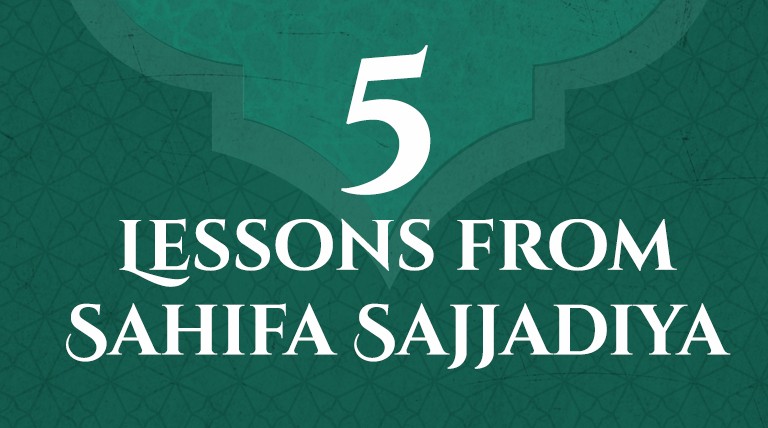Five Lessons from Sahifa Sajjadiya

Imam Ali Ibn al-Hussain (p) was the fourth Imam and the great-grandson of Prophet Muhammed (pbuh&hp). Among his most prominent titles is Zayn al-Abidin (“the ornament of worshipers”), which he was given on account of his exceptional dedication to worship and obedience to God.
The only adult male to survive the Battle of Karbala, the Imam (p) became the rightful leader of Muslims and was thus tasked with guiding people back to the way of the Messenger of God (pbuh&hp). He notably testified to the events of Karbala and the injustices faced by the family of the Prophet (pbut) on Ashura even while at Yazid’s court in Damascus.
Following Ashura, Imam Zayn al-Abidin (p) dispersed Islamic knowledge and engaged in constant prayer, supplication, and remembrance of God. He left behind an important compilation of supplications named Sahifa Sajjadiya. An oft-neglected resource, these supplications can act as spiritual fuel to strengthen our connection to God when we most need it.
Here are five lessons the Imam (p) teaches us in Sahifa Sajjadiya:
- Humble yourself before God: In the Supplication of Asking for Release from Sins, Imam Zayn al-Abidin (p) says, “so here I am, O Lord, thrown down before You! I am the one whose back is weighed down by mistakes! I am the one whose lifetime has been consumed by sins! I am the one who—in his ignorance—disobeyed You, while You did not deserve that from him!”
Though he is an infallible Imam, the Imam (p) describes himself as small, weighed down by sins, and desperate for God’s forgiveness. When we examine our actions, we must recognize our shortcomings and allow them to humble us, for we are in a constant state of need for God’s guidance and mercy.
- Be grateful: In his Supplication for Himself and the People Under his Guardianship, the Imam (p) states, “O God, bless Muhammad and his Household and put the soundness of our hearts into the remembrance of Thy mightiness, the idleness of our bodies into giving thanks for Thy favor, and the flow of our tongues into the description of Thy kindness!”
And so the Imam (p) teaches us that gratitude is an active practice and a conscious effort. We must find it in our hearts and express it with our bodies.
- Begin and end each day with the remembrance of God: Each day is a blessing and a miracle. By beginning each day with Imam Zayn al-Abidin’s Supplication in the Morning and Evening, we can better remember the signs and miracles of God which we take for granted.
By saying, “Praise belongs to God, who created night and day through His strength, set them apart through His power, and appointed for each a determined limit and a drawn-out period,” we can become more God-conscious.
- Honor your parents: In His Supplication for his Parents, Imam Zayn al-Abidin (p) says, “God, lower before them my voice, make agreeable to them my words, make mild before them my temper, make tender toward them my heart, and turn me into their kind companion, their loving friend! O God, thank them for my upbringing, reward them for honoring me, and guard them as they guarded me in my infancy!”
We can turn to this supplication when we need to be reminded of our duty to our parents or need God’s support and guidance to better our interactions and relationships with them.
- Remember death: When the Imam (p)learned of someone’s passing or reflected on death himself, he recited his Supplication When Death Was Mentioned, which includes the lines, “Keep us safe from the delusions of expectations, make us secure from their evils, set up death before us in display. And let not our remembering of it come and go! Appoint for us from among the righteous works a work through which we will feel the homecoming to Thee as slow and crave a quick joining with Thee.”
When death presents itself to us, it signals that this life is temporary, and this world’s problems and desires are fleeting. Building an awareness of death inspires commitment to our greater purpose. We should ask God always to grant us a life and death that pleases him, one with our feet firmly planted in His path.

Leave a Comment:
You must be logged in to post a comment.